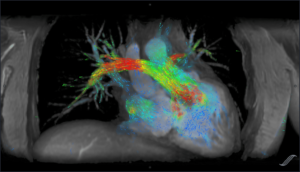 If you think that the real-time world of diagnostic medical imaging has no place for artificial intelligence (AI), you’d be wrong. It might be disconcerting to imagine a computer “mind” looking at your latest scan instead of a human one, but recent trials have shown that AI programs have both a high rate of assessment and a high degree of accuracy, and furthermore, in some cases they can do better than the human eye in catching imaging anomalies.
If you think that the real-time world of diagnostic medical imaging has no place for artificial intelligence (AI), you’d be wrong. It might be disconcerting to imagine a computer “mind” looking at your latest scan instead of a human one, but recent trials have shown that AI programs have both a high rate of assessment and a high degree of accuracy, and furthermore, in some cases they can do better than the human eye in catching imaging anomalies.
Business as usual: radiologists view thousands of images each day
By and large, practitioners are juggling workloads that fall on the spectrum of heavy to impossible. Estimates in the field have radiologists needing to view a new image every three to four seconds, every day. It’s not a stretch to assume that many doctors might welcome reliable help, especially when it comes to “eyes” that aren’t subject to fatigue.
For example, Arterys is a browser-based software currently in use at more than three dozen medical facilities across the globe, including Virginia-based Fairfax Radiological Consultants and the University of California at San Diego. The software goes through a long period of “training” by its human programmers who teach the algorithm to distinguish between types of data it’s being fed. In that sense, the AI “learns” which imaging patterns are normal and which signal alarm.
Potential for “huge amount of consistency”
Carla Leibowitz is the head of strategy and marketing for Arterys. Referencing how the company’s cardiac MRI can draw from the thousands of imaging samples it’s been presented and therefore can absorb repetitive tasks in analyzing data, she told Modern Healthcare that that brand of AI automation “frees up a lot of physician time and brings a huge amount of consistency to imaging and tracking changes over time in a patient.”
And that means that the use of big data in medical analytics can reduce bottom-line costs as well.
Is today’s FDA lagging behind the promise of AI?
Despite the benefit that AI might offer the healthcare industry, experts say that the U.S. Food and Drug Administration (FDA) isn’t necessarily poised to fling open the regulatory gates to the technology — at least not with current rules in place.
The last draft guidance issued by the FDA (in 2016) stipulated that certain medical devices (including algorithm-based devices) must undergo re-approval each time significant changes are made. Of course, the very nature of AI is that it will change — rapidly and often. And considering that the algorithms are set up to learn from all the data they receive, the FDA’s requirement for re-approval can hamper this kind of AI implementation.
Leibowitz called FDA regulation “quite burdensome today,” and added that “sometimes it’s confusing and adds huge chunks of time to our development timeline.” However, she is not suggesting that the agency’s regulatory oversight be done away with — she realizes that having the FDA stamp of approval on the AI algorithms is a powerful way to build the public’s trust in the new technology.
Healthcare will always need doctors
And what about those who envision hospitals of the future coldly peopled by robots? How can medical AI experts allay the fears that computers will edge out doctors themselves?
“We don’t think this is going to replace the physician at all,” Leibowitz said. “The physician does a lot more than look for patterns and connect the dots.”
This blog post is provided for educational purposes only and is not offered as, and should not be relied on as, legal advice. Any individual or entity reading this information should consult an attorney for their particular situation. For more information/questions regarding any legal matters, please email [email protected] or call 310.203.2800.